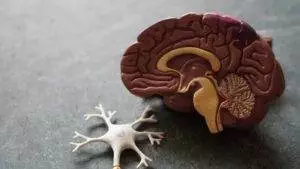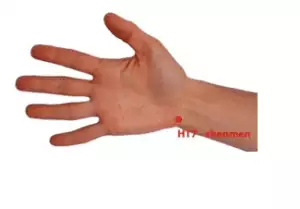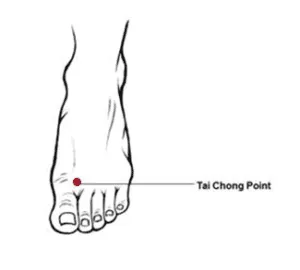-
 Art of Wellness Acupuncture & Traditional Chinese Medicine (TCM)11704 Wilshire Blvd, Suite 295, Los Angeles, CA, 90025
Art of Wellness Acupuncture & Traditional Chinese Medicine (TCM)11704 Wilshire Blvd, Suite 295, Los Angeles, CA, 90025
myartofwellness@gmail.com310-451-5522 Office Hours
MonClosedTue7:30 am --4 pmWed7:30 am --4 pmThu7:30 am -- 4 pmFri7:30 am -- 4 pmSat7:30 am -- 4 pmSunClosedOur office opens from Tuesdays to Saturdays 7:30 am to 4 pm, will be closed on Memorial day, Independent day, Labor day, Thanksgiving day, Christmas and New year.
-
Recent Posts
- Chinese New Year 2026: Year of the Horse
- Acupuncture and TCM Treatment for Perimenopause Symptoms
- How to Treat Insulin Resistance With Acupuncture and TCM
- How to Treat Metabolic Syndrome With Acupuncture and TCM
- How to Treat Syncope With Acupuncture and TCM
- How to Treat Thoracic Outlet Syndrome With Acupuncture and TCM
- How to Treat Dupuytren’s Contracture With Acupuncture and TCM
- How to Treat Nutcracker Syndrome With Acupuncture and TCM
- How to Treat Rosacea With Acupuncture and TCM
- How to Treat Perioral Dermatitis With Acupuncture and TCM
- Lymphatic Drainage With Acupuncture and TCM
- How to Treat Turf Toe With Acupuncture
- How to Treat Nerve Pain With Acupuncture and TCM
- How to Treat Watery Eyes With Acupuncture and TCM
- How to Treat Ovarian Cysts With Acupuncture and TCM
- How to Treat Dystonia With Acupuncture and TCM
- Sign up to receive news and updates and get my free report:“The Top 10 Reasons to Try Acupuncture”

November 2025 M T W T F S S 1 2 3 4 5 6 7 8 9 10 11 12 13 14 15 16 17 18 19 20 21 22 23 24 25 26 27 28 29 30
Herbs
What is Multiple Sclerosis and How to Manage MS with TCM & Acupuncture
Multiples Sclerosis is autoimmune disease, Traditional Chinese Medicine & Acupuncture are very helpful to improve these condition.
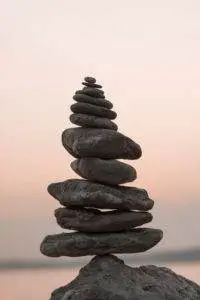
Dr.Tan’s Case and Testimony
Mr. M- a healthy 50-year old Caucasian gentleman—first visited my office Art of Wellness Acupuncture a few years ago. As an attorney, he had been working very hard to support his two daughters, who were both in college. About four months ago, the onset of serve lower back pain along with tingling in his left leg changed his life completely. He saw several doctors, had a number of x-rays and an MRI which revealed a moderate bulging disk on L4-L5. He tried different pain pills, NSAIDs, and underwent three months of physical therapy, none of which had helped. Recently, he had been experiencing numbness and weakness in his left leg, and was suffering from depression due to his inability to carry on with daily work and regular activities. When he talked to me, I noticed that he constantly rubbed his eyes. I asked if he felt any abnormalities in his vision. He answered yes, and that he had periodic occurrences of blurred vision. When I suggested that he showed me how he walks, I noticed his poor balance. He tended to fall on his left side because his left leg did not seem to follow his motion. Then I checked his knee and ankle reflex and found that they were excessively active. I was almost certain that the condition that made him suffer so much in the last few months was not a simple bulging disk or sciatica; it was a disorder of the central nervous system-Multiple Sclerosis. Immediately, referred him to a neurologist and suggested that he have a brain and cervical MRI. Two weeks later, he came back to my office with a confirmed diagnosis of Multiple Sclerosis.
Mr. M. is just one of 200 patients who are diagnosed with MS every week in the United States. There are about 400,000 people in the U.S. and 2.5 million patients who are suffering from this disease in the world.
Cause of MS
MS is an autoimmune disease in which infections or environmental changes can confuse the body’s defense system. Sometimes a foreign antigen mimics a group of the body’s own proteins. When the immune system response by mounting an attack against these foreign invaders, it inadvertently destroys the foreign antigen along with any similar antigens, including the body’s own tissues.
A recent study shows that a virus called adenovirus type 2 looks remarkably similar to the composition of the protective covering around the spinal cord and parts of the brain—the myelin sheath cells. The attacks of the immune system of this virus along with the mistaken attack on the myelin sheath is believed to be the ultimate cause of multiple sclerosis。
Common symptoms of MS
- numbness or tingling, usually in the leg or arm
- muscle weakness
- dizziness
- spasticity
- pain (moderate to severe)
- Ataxia
- Tremor
- Slurred speech
- Blurry, double vision or blindness
- bladder malfunction
- bowel dysfunction
- sexual dysfunction
- depression
- euphoria
- cognitive abnormalities
- fatigue
Most commonly, MS first manifests itself in a series of attacks followed by complete or partial remission as symptoms mysteriously lessen. These symptoms, however, will return later after a period of stability. This is called relapsing-remitting (RR) MS.
Treatment of MS
Unfortunately, there is no cure for MS yet. In Western Medicine, the treatment focuses mainly on decreasing the rate and severity of relapse. Beta interferons, anti-cancer drugs (to weaken the immune system), and steroids are commonly used for the treatment of MS. These medicines can reduce the number of MS lesions, delay the progression of the disease, and provide symptomatic relief for the patient.
In TCM, a condition called “Wei Syndrome” with symptoms similar to MS, was documented 2000 years ago in a classic Traditional Chinese Medicine book called Emperor Classic Medicine. Acupuncture and Traditional Chinese Medicine has been involved in the treatment ever since. MS patients who have tried acupuncture report improvement in pain, spasticity, numbness and tingling, fatigue, depression, anxiety, and bowl, bladder function.
Maintaining a healthy lifestyle is very important for the MS patient. This includes:
- Getting enough time to sleep and rest. Go to bed early
- Exercise regularly. Tai Chi and Yoga are very good to help patient relax, balance and with muscle strength
- Balanced diet, a lot of vegetables and enough protein from white meat
- Stress management
- Daily meditation and positive thinking
- Staying connected with friends and joining a support group
- How to reduce and prevent inflammation
Patient Story- Gilly
I was diagnosed with Relapsing Remitting MS in 1991 and I had no idea what a crazy, unpredictable journey I was about to embark on.
I woke up one morning, tried to get out of bed but my legs were like jello, I had no balance and had double vision.
I was given a spinal tap and MRI and lesions were detected on my brain & cervical spine.
When first diagnosed, my neurologist put me on one of the few FDA approved medicines for MS which don’t cure the disease, but delay the progression. For that I inject myself daily and have done so for 17 years
For the first 7 years after being diagnosed, I experienced relapses (flare up of symptoms) on average twice a year. The treatment for relapses was a 5 day course of steroids administered through IV, followed by 12 days of oral steroids.
The relapses affected my motor skills the most, especially walking but after a treatment of steroids, I was almost as good as new.
My friends suggested I try acupuncture. I was recommended to Dr Tan because he had studied MS in China. *
Dr Tan has been monumental in my life. He has given me treatments for a multitude of injuries I’ve suffered over the years due to frequent falls and is an expert in pain relief. He treats me for stress relief which contributes my general wellbeing. Dr Tan is very knowledgeable about Western medicine and MS treatments so I always ask his opinion.
I’ve been diagnosed with MS for 21 years and feel fortunate that Dr Tan has been treating me for a large part of that time. Although I partake in Western medicine, I know that Western medicine only treats the symptoms but Eastern medicine treats the cause of the symptoms.
My MS has progressed to the stage that I now use a wheelchair full time.
I go to acupuncture for preventative care. My immune system needs extra help especially during cold & flu season.
I am very aware that MS is a ‘designer’ disease, and no two people have the exact same symptoms. I would encourage anyone with MS to avoid stress, keep up a healthy immune system and try to stay positive and happy, because your emotional state affects your physical being.
How to Sleep Better with Acupuncture and TCM
By Qineng Tan, L.Ac., Ph.D.
Do you suffer from insomnia or do you have trouble falling asleep and staying asleep? Acupuncture and Traditional Chinese Medicine (TCM) offers many solutions on how to sleep better without sleeping aids. TCM stresses the importance of getting a good night sleep. Chinese medicine has tools such as; exercise, Chinese herbal medicine, acupuncture, and meditation all which can help you get a good sleep so you can function at the highest potential throughout the day. Below you will read about TCM and the history it provides in regards to sleep and the many tips that can help you get the best sleep tonight.
History of Sleep with TCM
Sleep is a part of the interplay of yin and yang: yang energy is dominant when we are awake and active, and yin energy rules sleep. Night is yin; daylight is yang. This is all in keeping with the holistic, universal nature of TCM (Traditional Chinese Medicine) theory. Our bodies are designed to work with the movements of the earth, sun, and moon. When a person experiences insomnia, either hard to fall asleep or wake up often then difficult to fall back to sleep, there is a lack of balance. The body is out of sync with its environment. The yang energy is taking over, or not interplaying with yin appropriately.
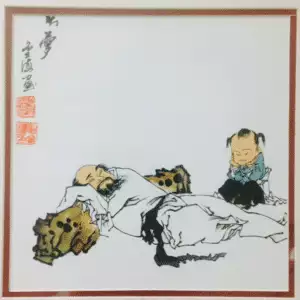
In TCM terminology, “Shen” is the spirit, the energy which controls our mental activities and thought. During sleep, Shen “hides” in the organs – predominantly the Heart and the Liver – resting, so that it can function with sharpness during our waking hours. Insomnia, in TCM, is often viewed, then, as a problem of the Heart system, or the Liver system. If one of these major organs is unable to “house” the Shen, then the Shen will wander restlessly, causing sleeplessness.
Protective Qi cycles through the body continuously, but it follows different paths along the meridians at different times of the day and night. During the day, protective Qi, which fights off pathogens, moves through the yang meridians, and during the night, it flows through the yin meridians. If you find yourself waking up at a particular hour in the middle of the night every night – or feeling sluggish at one particular time every day – it is probably related to some deficiency of Qi in that area.
Between the hours between 1:00 and 3:00 a.m. the liver meridian is actively supplying Qi to the liver system so that it can clean toxins from the blood. Then, between 3:00 and 5:00 a.m., the freshly cleaned blood and energy is being delivered to the organ systems. It is especially important to be sleeping soundly during that time. The liver does all the heavy lifting of cleaning and detoxifying the blood and therefore, the whole body. If the liver is stinted of its full rest and rejuvenation, night after night, we can be left feeling truly sick and tired.
Sleeplessness may be the central problem for some people; for others, it’s just a part of the big picture. Many people have gone so long without restful sleep that they have become used to it and just consider it their new “normal.” When you come in to Art of Wellness for a visit, our doctors will ask many questions to get a sense of what kind of sleep problems you’re having, including other symptoms that may be related to the same root issue.
- Having trouble falling asleep may be related to an excess condition of the liver and/or gall bladder.
- Waking easily and then having trouble falling back to sleep may point to a deficiency of the Heart Yin or too much internal heat.
- Nightmares may indicate a gall bladder meridian problem, while repetitive, literal dreams (about work, for example) might indicate a heart/spleen problem.
Sleep problems can be related to other conditions, such as depression, menopause in women, fibromyalgia, chronic fatigue syndrome, and cardiovascular disease.
How to Make Winter A Time of Rest and Renewal
Getting a good night sleep is always important, but in the Wintertime. Nature and our bodies are really asking us to rest more, and more deeply, than we do during other times of the year. This is a time for the body to store energy. If we go at a frantic pace, and behave the same way we do in the middle of summer, we will become depleted.
Unfortunately, our current culture does not necessarily support this idea. It seems we are asked to do more and be more than ever during the rush of the winter holiday season. It really is vital to prioritize “doing less” in order to preserve good health.
People with sleep problems seek tips for help. The practices in acupuncture and TCM help you to be calm. Visit the link and read some TCM tips for sleep.
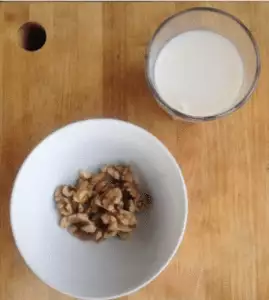
Top 20 Tips For Creating Calm so That You Can Get A Good Sleep
- Choose carefully how many social commitments you make. You don’t have to attend every gathering – only the ones that are meaningful to you. If it feels more like an obligation than fun, make a plan to stop in, extend your greetings, and then leave early. This way, you won’t overeat, drink too much, and you can still get to bed a reasonable hour
- Don’t exercise too vigorously close to bedtime. An evening walk, or gentle program of Tai Qi or yoga will help you work out excess energy with stimulating you further
- Deep breaking techniques: using you lower abdomen, inhale deeply. Hold it for about 5 seconds, and then exhale slowly through your mouth. Repeat ten times. Deep breathing exercises not only relax your mind, but they help to dispel negative Qi from the body before bed
- Create an oasis of calm in your bedroom, with good ventilation, restful colors and no devices. Set a time, half an hour to hour before going to bed, when you will discontinue watching TV or looking at your computer and phone. The light stimulus from the screen is not helpful for falling asleep. Reading a book, writing in a journal, coloring in a coloring book, are all activities that help you wind down for the night.
- Change your eating habits: many people wake up around 3 AM and find it difficult to fall back asleep. This may be cause by low blood sugar level due to the over activity for the adrenal gland. For a better sleep, try to balance your blood sugar level daily by eating small portions of food about every 3 hours and drinking a glass of warm, low fat milk or eating a handful of nuts—such as raw walnuts or almonds, before bedtime. It helps to balance your blood sugar. Waking up in the middle of the night can be caused by fluctuating insulin levels – the result of too much sugar or alcohol in the evening.
- Keep your feet warm by soaking them in hot water for 15-20 minutes before bedtime. Also, massaging the bottom of the feet can help to stimulate key kidney points. Give a good, fast rub to the center of your soles for a few minutes to warm them while getting into bed.
- Stimulating acupressure points just before bedtime can be helpful. Use your thumb or fingertip to apply moderate pressure and rotate clockwise for 2-3 minutes.
- Shen Men, called the “Spiritual gate” point, releases heart fire, excitement, anger, irritation and anxiety.
- Tai Chong, a liver point can help alleviate insomnia due to excessive heat or stagnation in the liver, which can cause feelings of depression, stress, sadness.
- Take off any constricting clothing (underwear), and wear loose, comfortable pajamas for bedtime.
- There is an old saying: “sleep like the crescent moon.” Sleeping in a fetal position on your right side puts your heart above your liver, which helps drain blood, giving the heart some relief and extra nourishment to the liver. It also helps food move through your digestive system properly.
- Keep away from interruptions: Turn off your phone after dinner or keep a note book by your bed. If you keep thinking about sometime important to do, write it down.
- Listen to calm and relaxing music
- Sleep and wake at the same time every day, yes that includes weekends. Do not stay in bed for too long even when you do not have to go to work. Your body needs to have a regular sleep-wake cycle in order to function at its maximum

Shen Men Point - Reduce the water temperature for baths and showers: when the water temperature is well about body temperature, your body heat increases. Then when you get out of the water, your body heat decreases. Try to avoid such fluctuation of the body temperature.

Tai Chong Point - Keep your bedroom simple and clean: limit the number of electronic devices such as TV’s, computers from your bed room
- Do not play video games at night
- Obey the 20-minute rule: if you do not successfully fall asleep in twenty minutes, get up and do something else until you feel tired and ready to sleep again.
- Waterfall Meditation. In this exercise, imagine yourself at the base of a waterfall. As you breathe in and out, picture the water gently raining down on you, trickling down each route until the tension inside you releases, allowing your entire body to enter a peaceful and relaxed state.
- Oneness Meditation. Just as in the Waterfall exercise, picture yourself standing beneath a waterfall. This time, however, instead of relaxing parts of your body one section at a time, allow your entire body to relax simultaneously. Let the image of the water wash away any stress or anxiety that burdens you.
If you have tried all of these things are still not sleeping well, please come see us to find the underlying problem. Acupuncture and herbs can help address and correct deeper issues that are affecting your ability to find rest and peace. If you find you are experiencing insomnia or any other sleep disturbance, seek out solutions. Left unaddressed, a sleep problem can become chronic and debilitating. Talk to us, so we can help you pinpoint and fix the problem with lifestyle adjustments, acupuncture treatments, and herbal formulae.
Go Beyond Skin Deep with TCM
by Xiaomei Cai, L.Ac., Ph.D.
“The qi of the five zang organs manifests in the face. . .if we see green like jade, red like the crown of a rooster, yellow like the underside of a crab, white like the lard of a pig, or black like the feathers of a black chicken, these are the colors of life.”
– The Yellow Emperor’s Classic of Medicine
A practitioner of Traditional Chinese Medicine can tell a lot about your health from your face and your skin. In TCM, each of the organ systems corresponds to one of the sense organs; so the appearance and function of the eyes, nose, mouth, ears, and eyes can give the doctor information about what might be going on in the liver, heart, intestines, and other major organs. Conversely, problems in the liver, etc., will show on your face. The skin is considered the “opening” of the lungs; this is why problems with environmental toxins often display themselves through skin conditions such as eczema, rashes, psoriasis, hair loss, acne, dullness or roughness.
In other words, we know that health, and beauty, are not only “skin-deep.” The skin’s surface and the life of the facial features give us clues as to what is going on underneath. The skin reflects imbalances of the internal landscape of the body. Stress and strong emotions, hormone imbalances, inappropriate dietary habits and environmental influences all will be represented on the skin, our largest organ. We must treat the underlying conditions deep within the body first, then we will see the skin bloom with health. Any skin condition is like a red flag showing that there are some impurities or toxins building up inside. Normally, our bodies can self-clean; our liver and kidney filter all impurities out. But if there are too many toxins, or the body is under a lot of stress –eg., not enough sleep, or lacking in regular “tune-ups,” just as a car needs maintenance at regular intervals–, then the problems build up and break outs occur.
For example, conditions such as scaling psoriasis and rosacea are often caused by excess internal heat, especially that which we call Stomach Fire, so our acupuncture and herbal treatments will be designed to clear the heat, along with dietary changes, such as avoidance of alcohol, coffee, sugar, and red meat (all of which we recommend avoiding, anyway). Western medicine will often treat these conditions with cortisone, which may suppress the some of the symptoms for the duration of use, but it will not address the root cause. Long-term use of cortisone can have very detrimental effects on your overall health.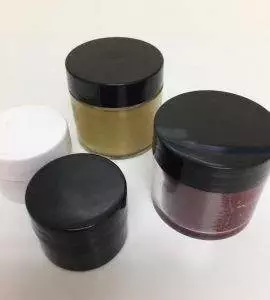
Hives – itchy, red patches that come and go – are considered by Western medicine to be caused by histamine reactions, and are almost always treated with antihistamines. In TCM, they are considered a “wind rash;” like wind, they can be cold or hot, and can move from one place to another quickly. This signals a weakness in the exterior immune barrier that your skin provides, and that you are extra susceptible to stress and/or allergens in your environment. Balancing the excess heat or cold in the body with acupuncture treatment, discovering where the irritants are coming from and altering your diet, hygiene regimens, etc. can alleviate the hives, and also strengthen your overall immunity.
Eczema, or dermatitis, can show up in many forms, but they are all due to imbalances in the body caused by toxic buildup from both external and internal sources. Again, stress and hormones play a role, as do the plethora of artificial toxins in our environment. The body’s own immune response to this constant bombardment of toxins can cause skin irritations. Our strategy might include building up deficient blood with more nutrients, clearing dampness, and prescribing cleansing herbs and foods.
Acne – pimples or lesions that break out on the skin’s surface – is not a superficial problem. It is always related to things that are going on internally, often with the digestive system. Improper diet or imbalances in hormones lead to inflammation that is “overflowing,” and, having nowhere else to go, erupts out of the body through the skin. Making appropriate modifications to your food program and balancing hormones will clear the acne for good, where topical solutions and birth control pills provide only temporary improvement.
If aging is your concern, we are able to choose specific points for an acupuncture facial, which tightens and tones the skin and boosts the production of collagen. This treatment will help smooth fine wrinkles, improve circulation, and hasten healing of any acne, rosacea, and other skin irritations. Acupuncture also releases endorphins, which make you feel more relaxed and positive. Most people find acupuncture treatment painless and relaxing. You can see a difference after just one or two treatments, but the benefits keep growing, as the results are cumulative.
Why choose acupuncture over modern dermatological procedures? If you are looking for treatment that is natural,with natural-looking results and no or minimal negative side effects, it is worth a try. If you come with a skin condition, we will conduct a full consultation to determine which organ system has an imbalance and offer acupuncture treatment to improve Qi flow, cupping to get rid of deep tissue toxins and activate the lymphatic system to clean the internal organs, herbal therapy to clear heat, and dietary suggestions to prevent the skin condition from coming back.
TCM for Cold and Flu Season
by Qineng Tan, L.Ac., Ph.D.
TCM has a history of treating illness going back thousands of years. One particularly famous doctor of the Ming dynasty (6th Century A.D.), named Sun Simiao, wrote a 30-volume encyclopedia called “Prescriptions for Emergencies Worth a Thousand Gold.” This work not only described herbal formulas (although it did detail over 4000 of them), but treatments for all types of conditions, including entire volumes on the care of women and children.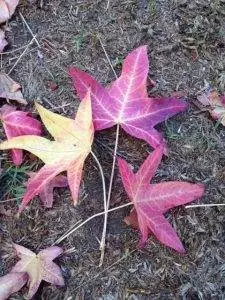
Sun Simiao was practicing during a time of widespread infectious disease in China, and he developed herbal treatments for all types of illnesses, including what he would have called “blood fever.” His pioneering work is the basis for treatments we still use today for treating viruses.
You have probably heard the stories about how, in the olden days, acupuncturists and herbalists did not charge their patients when they were sick–because it was their job to keep them healthy in the first place.
This is because we have known for a very long time that the best offense is a good defense. The best way to stay healthy and keep your loved ones healthy, whether it’s just another wintertime “cold and flu” season, or a global pandemic, is to be well-informed about prevention, how contagion spreads, and first steps to take when someone around you falls ill.
First, pay close attention to the changing of the seasons and how your body is affected. Dress appropriately for the cooler temperatures and brisk winds of the fall season. Don’t try to fight the early dying of the light each day. Instead, be gentle with yourself, and find seasonal routines that involve turning in early and rising with the sun. As always, drink tea for good health!
Regular acupuncture treatments help keep your entire body, especially the immune system, functioning at peak efficiency, so that when you come into contact with pathogens, your body is ready to fight them off quickly.
Here are some other things you can do to keep your immune system at the ready:
1. Get adequate rest.
2. Maintain a healthy diet, with as little processed/GMO food as possible.
3. Drink lots of clean water with good mineral content.
4. Avoid chemical medications that suppress your body’s natural functioning to overcome illness in the guise of “helping symptoms.”
5. Get plenty of exercise, fresh air, and sunlight–Vitamin D is very important.
To help stop contagious illness from spreading, you should, of course, wash your hands thoroughly and often. Pay attention to your sensations and intuition. If you start to feel run-down, weak, head-achey, or feverish, don’t dismiss it and try to push through your day. Slow down, and take it easy. Make an extra effort to avoid eating any junk food or consuming alcohol. Don’t drink caffeine, either, even if you think you need to keep your energy up. Caffeine produces false feelings of energy that can cause you to overexert yourself, when you should try to rest.
At this point in time, Western Medicine has no methods for treating viral infections. Most medicinal preparations are aimed at making the patient more comfortable, but none of them act as a cure, or even help the body’s own resistance. TCM herbal formulae, on the other hand, not only help reduce suffering from uncomfortable symptoms; they offer proven efficacy in helping to stave off and slow down the spread of pathogens in the body. They can also help for speedier and more thorough recovery from illness.
Eating to Reduce and Prevent Inflammation
By Xiaomei Cai, L.Ac., Ph.D.
We usually think of inflammation as something that affects our muscles and joints, causing them to swell and ache. More recently, science has made it clear that inflammation is also part of what causes poor blood flow through the arteries, causing problems of the circulation and the heart. But, really, the root cause of inflammation is a function of the metabolism, or digestive process. It is the body’s normal defensive response to excess internal heat. Excess heat can be caused by stres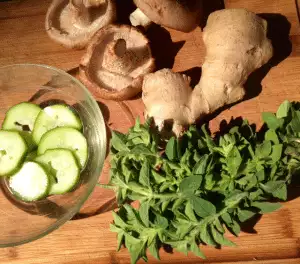 s, too many calories, and the wrong kinds of foods.
s, too many calories, and the wrong kinds of foods.
An anti-inflammatory diet is, first and foremost, a low calorie diet. The meaning of “calorie” is, after all, a unit measurement of heat energy. Simply put, ingesting more calories creates more heat in the body. If the calories aren’t being burned through physical activity, then they are stored in the body as excess fat. Fat not only weighs you down, but triggers the immune system, which tries to attack the fat as if it was a foreign substance. Carrying excess fat acts on several levels to create detrimental inflammation within the body.
It is important to pay attention not only to what you eat, and how much, but also how you eat, and when. Many people’s eating habits lead to poor digestion.
Eat sitting down. The body draws both blood and Qi into its center – the stomach and spleen – in order to digest food. Eating while standing or walking, or trying to concentrate on some other problem, draws much-needed energy to the extremities or the brain, away from the digestive process.
Chew food thoroughly. Failure to chew adequately means that the rest of your digestive system has to work harder to break down your food into usable nutrition.
In general, choose more fresh, raw, and lightly cooked foods, and avoid baked, fried and heavily processed foods. These foods retain the heat energy that was used in their preparation, and that creates more heat inside you.
Increase your use of ginger, turmeric and herbs like rosemary, thyme, and oregano, all of which have anti-inflammatory properties. Choose high Omega-fatty-acid fish such as salmon, and good quality fish oils. Eat lots of leafy greens. Avoid coffee, and drink green tea instead. Fermented foods such as pickles, sauerkraut/kimchee, miso and tempeh help to heal and promote good balance in the intestines. Shitake mushrooms are a source of copper, a rare nutrient, important in the prevention of arterial inflammation.
It probably comes as no surprise that we recommend cutting back on unhealthy fats (trans fats, processed cooking oils, and fatty red meat). And avoid sugar as strictly as possible, as sugar consumption leads to insulin resistance and is a major cause of inflammation.
Avoid the nightshade vegetables: peppers, eggplants, potatoes and tomatoes. This includes spices and seasonings made from peppers, such as paprika and red pepper flakes. These foods can irritate the intestines, affecting their permeability and setting off unwanted immune responses. These in turn lead to inflammation, muscle spasms and stiffness.
